
by wp-admin | Dec 9, 2021 | Exploring the Mental Fitness Formula
 When I was fourteen I decided to make a mosaic out of the stones I’d collected from the Lake Michigan beach near us. My dad took me to the lumber yard to get Elmer’s Glue and a handy-panel and I began sorting them on the back patio. I drew a rough design and spent hours for several days creating this rambling picture that may somehow capture who I was then.
When I was fourteen I decided to make a mosaic out of the stones I’d collected from the Lake Michigan beach near us. My dad took me to the lumber yard to get Elmer’s Glue and a handy-panel and I began sorting them on the back patio. I drew a rough design and spent hours for several days creating this rambling picture that may somehow capture who I was then.
To this day I use a similar crafting method, but now I can use the FORMULA concepts and Eric Berne’s intuitive approach to help me. Together they allow me to sort out my interior reactions along with my pebbles. I offer this example to illustrate how your Parent-Child dynamic operates in a simple situation before you encounter more complex ones in the following posts.
To make a mosaic my Adult and Child first prepare the materials and decide on the size and shape of the project. Then my Adult directs me to:
- Collect all the stones needed for the design.
- Sort them into piles of similar types and choose which to use.
- Design each section in detail and set the stones, trying different arrangements until the whole picture comes together.
- Keep my Critical Parent from ruining the experience by telling me to worry about other tasks and my Indulgent Parent from letting me craft so long that I neglect those.
- Balance my Child’s needs for fun and rest with the need to work on the project for many hours.
The Mental Fitness FORMULA can help you manage a process like this well. Your Adult plans and designs things with input from your sensing and feeling Child. Your Parent parts express their view, and their beliefs. My Critical Parent may tell me I’m wasting my time (Belief #3, you’re failing to meet a standard you’ve set). In recent years when I saw the amazing mosaics on Pinterest, my Critical Parent suggested that I must equal or surpass their skill or it would be stupid to continue (Belief #2 ). If my Child wants to keep playing when I need to stop and do chores, my Indulgent Parent may take its side. Citing Belief #11, it could suggest that I’m special because I usually work hard and so it’s okay to neglect things to have fun. Kept on the edge of fight-or-flight, my Child can be left confused and conflicted about enjoying the “fun” project. Full disclosure, I don’t make a mosaic very often.
My Adult must balance all three of these inner voices and guide me to take the best course for the short- and long-run. I often feel tension in my gut when I take very long at anything for simple pleasure. The FORMULA only takes me so far in the short run. I’m wired to be more anxious generally, as a person in the group Elaine Aron calls “Highly Sensitive.*” I also inherited a family trait of impulsive intensity that often gets me committed in too many directions.
My toxic experience as a child instilled a drive to help others not endure what my family had to suffer. My Adult has consistently chosen to support a Critical Parent that will keep me on track for this. I always know I could choose differently, but my purpose-driven life in the long-run brings me joy and satisfaction. We all differ in what tempts our Child to push us too far at times or sometimes leaves our Child neglected. The discipline of Mental Fitness can help you manage and benefit from whatever inheritance and formative experience you bring to your life.
When I keep the FORMULA in mind, my Adult helps me stay more relaxed and healthy in simple, low-stress situations like crafting a mosaic. Consistent practice has prepared me to engage effectively and more comfortably in more demanding and potentially triggering situations. The process remains the same, but following my purpose, the triggers involve the Critical and Indulgent Parents of others which can drag in my own. For example, my Child gets upset when someone is unfair to me or anyone else and prods me to say or do something. My two Parents often disagree about the best response. Through all this my Adult must quickly guide me to respond to others with consideration for what their Parent and Child reactions might be.
Your Adult has to be skilled and quick to deal with your inner world or it won’t navigate others’ behavior well. Like driving a car in fast, heavy traffic, you need the smoothly functioning automatic reactions that only occur when you’ve gotten lots of practice on easier roads first. Gradually your skills will grow and you’ll find that you actually enjoy the challenge of more complex situations, once you trust that you can handle them well.
*Elaine Aron, hsperson.com

by wp-admin | Dec 9, 2021 | Exploring the Mental Fitness Formula
How could these two possibly come together? The struggle in your mind that prevents mental fitness consists of clashing brain elements. To bring them into harmony you have to know what they are and how to manage them. Here’s where pineapple upside-down cake comes in.
It’s after the holidays the second year of the Covid 19 pandemic and my Child has sneaked more fattening food than usual. Relatives’ Indulgent Parents joined with my own, allowing my Child to eat lots of things like pineapple upside-down cake. This year even my usually 12 pound dachshund, Dixie, gained a pound. Dixie doesn’t mind her rounder tummy, but I object to mine and I recall the fights I lost in my own head.
I remember a time when my inner-world supported my efforts to maintain a healthy diet. The impact of being ill with an especially toxic flu virus in 2018 and previous viruses since I was forty-seven left me with a damaged gut, many allergies and a foggy brain. To recover I sought help with functional medicine providers and followed their diet and supplement programs. While I worked for my health, I lost some weight and had no trouble resisting cake and ice cream.
My Child didn’t argue much because she was scared about what had happened to me. The idea of getting really sick again kept her on the edge of fight-or-flight. My Indulgent Parent focused on helping me find new ways to play with the healthy recipes my Adult discovered online. My Critical Parent kept after me about my failing to exercise as I was advised to do, warning my Child that she should stop watching so many cooking shows and get off the couch. I gradually managed to fend off Belief #4, that if something threatening (another viral attack) might happen, it’s helpful to worry about it frequently.
By the holidays this year I was feeling well! I decided I’d try eating dairy products again and really got into ice cream and yogurt which I’d really missed. I ate gluten-free desserts and just too many snacks. My Indulgent Parent pushed Belief #11 my way: If you’re special in some way you’re entitled to recognition and an easier path. I didn’t care about recognition, but I was ready for that easier path. I felt special because I’d worked so hard for years, depriving myself of favorite foods and often feeling hungry, things only a special person would do.
Self-pity swept over my Child instead of the pride she’d had over what she’d helped to accomplish in restoring my health. My Indulgent Parent was crushing my Critical Parent, so my Adult offered a compromise. Let’s just eat a little ice cream and a few sweet snacks. You know what happened next. Ever trying to keep the peace, my Adult kept looking for information to help find new ways to motivate internal cooperation.
One day YouTube played a video where Erica Sonnenburg explained in persuasive detail how the gut works against sustained diet changes.* It turns out that the “microbiome” that inhabits our gut will switch overnight when we change our diet for the better. And as we persist in our new diet, it will remain improved for a while. But it retains the memory of previous indulgences and will in time slide back in to our previous, less healthy but enticing diet.
So my Indulgent Parent cried, it’s not all my Child’s fault! We really are special if we can keep this up indefinitely with all the temptation around us, along with the corrupting influence of our own gut. Yes, it often helps to think of myself as more than one person! Now my Adult I realizes that as long as I feel healthy, the only motivation to keep up my new diet is how I look, and that’s not enough. I like my appearance better at this weight than with the extra twenty pounds I had for several years. It would be inconvenient and costly to buy larger clothes again. But I didn’t really feel unattractive with that extra weight, I felt cozier. And I enjoy shopping.
To make matters worse, my Critical Parent disapproves of focusing too much on such things. She often embraces Belief #3 that I deserve to be blamed and punished if I don’t meet the standard she sets. My Adult allows her to hold the standard that I should concern myself with the needs of others and my spiritual journey instead. My Adult works continually to help balance her input and I welcome the challenge to do as she expects. It’s a major source of meaning in my life. But just one extra pound? One piece of cake?
The end of the story about my diet is in the future! But I know what I’m dealing with here and so my Adult can remind me of self-talk that’s helped me settle my inner conflict about this before:
- You have to stop somewhere with weight gain, so why not stop while you can still fit into your present wardrobe?
- Do you really want to go through the past several years of health problems again and the weight merry-go-round? That’s what you’ve learned to expect.
- Let’s find other ways to indulge our Child that don’t have the side effects that poor diet does!
A wise friend once told me that she finally stopped smoking because she got sick of quitting. Maybe that’s what I’ll do: stop repeating the unpleasant process of quitting my healthy diet. I’ll put that into my Wise Parent’s chest of wise quotes, closer to the top.
*Justin & Erica Sonnenburg, The Good Gut: Taking Control of Your Weight, Your Mood, and Your Long-Term Health. (New York, Penguin Books 2015)
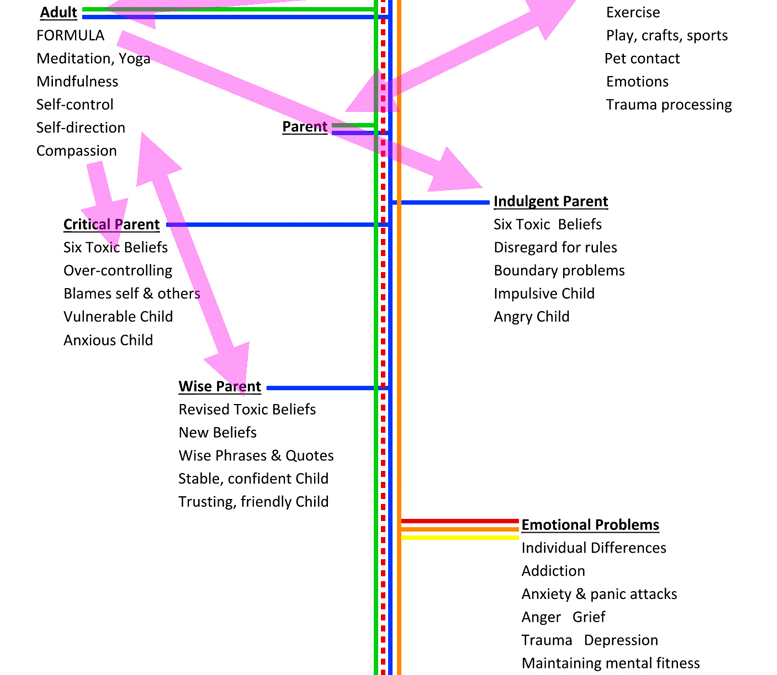
by wp-admin | Dec 9, 2021 | Exploring the Mental Fitness Formula
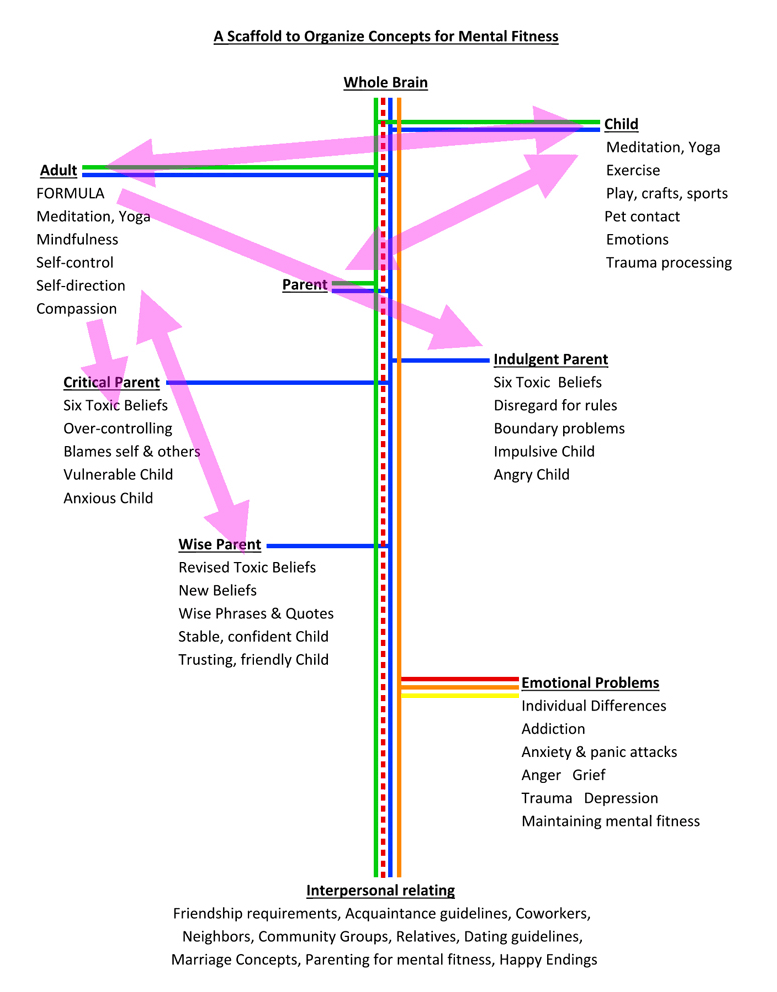
One day I decided that I should sort out for myself and my readers just how the FORMULA and the Adult-Parent-Child systems inter-connect and relate to Mental Fitness issues. I created the “Scaffold” here to capture this for us. In previous posts I’ve illustrated how these systems can combine by describing how I used them to combat fight-or-flight reactions in a few situations. Following the list of 12 Toxic Beliefs in the website discussion of the FORMULA, I noted that usually the first half of the beliefs belong to the Critical Parent and the next, to the Indulgent Parent. Then in Post #2 I admitted that I often think of myself as “we” instead of “I.”
In the scaffold drawing you can see arrows between the Adult-Parent-Child parts denoting how they influence each other. For you who like to have things sorted this way, I hope the scaffold helps. The entire scaffold will be more relevant in future posts. For now it might give you an overview for reference. For those who prefer a more intuitive approach, let me describe how I came to see my mind as multiple parts and why I find it helpful to divide it this way.
After my divorce in the 1970s I had to fend off waves of anxiety and dread that threatened to overwhelm me. I discovered that if my Adult could separate itself from my warring and confused Child and Parent parts, I could get my feet back on the ground. My own take on Eric Berne’s avatars (see ….) allowed me to function as a parent and graduate student despite frequent severe insomnia and panic attacks.
The fact that I could recognize and correct my toxic beliefs on my own was very reassuring and stabilizing. When negative feelings threatened to take over, I decided to use the reminder phrase, “Divide and conquer” to shove them aside. This gave my Adult the space to start sorting them out. My experiences as a mother, babysitter and teacher gave me a short-cut for how to comfort and reassure my own inner frightened or angry Child.
To sort out my Parent parts, I related each parent to half the beliefs and created reminder phrases for my Adult to use when they were too disruptive. “Stop exaggerating; none of this will kill us!” for my Critical Parent and “You’re just setting us up for future grief and we (Adult & Child) know it!” for my Indulgent Parent. These phrases respond to the basic message expressed through each Parent’s beliefs. They provided the space for my Adult to step in and revise any specific Child Brain Habits or Toxic Beliefs involved. “Divide and conquer!” worked so well that I’ve used it ever since.
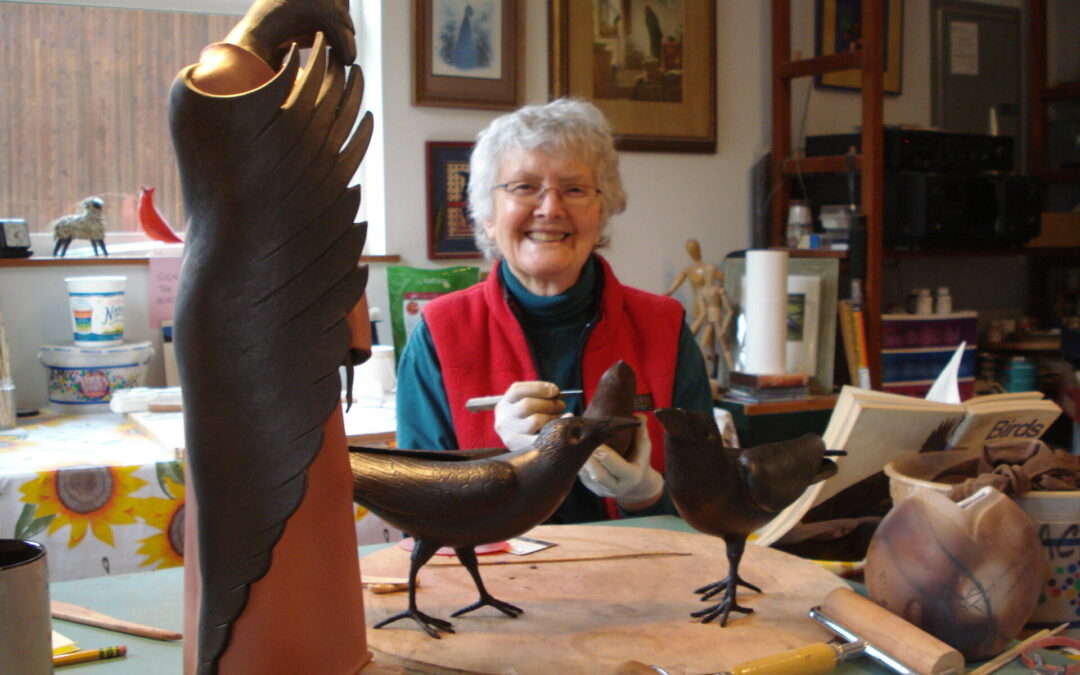
by wp-admin | Dec 9, 2021 | Exploring the Mental Fitness Formula
It seems to be easy for people to recognize their Critical Parent. When it presses it’s Toxic Beliefs on you, you feel it right away with a tightening gut or fists, flushed face, mental sense of being overwhelmed, prickling on the back of your neck or other body fight-or-flight reactions. Here’s an example of how your Adult and Wise Parent can limit its impact and keep you calm.
Ann Kelly, pictured above in her cozy pottery studio, demonstrates as a teacher the effects of not subscribing to Belief #3. This belief holds that when people, including yourself, don’t meet some standard you’ve set, they must be blamed and/or punished. In her studio, after I accidentally stained her new gray carpet with fine red clay, she had every right to chastise me. Instead, she provided a towel to put below my table and assured me that the stain might come out with a thorough cleaning. I felt awful, but without the clutch in my gut I would have had in my younger years, partly due to her kindness, and partly due to my work to reduce the power of belief #3.
What happens in your particular body when you’ve made a mistake that hurts someone else? That’s your Adult’s signal to step in and assure your Child that your life is not at stake. Remember, your body can’t help with complex problems. It’s only designed to save your life, not your friendships or your reputation. Ann helped reassure me with her kind response, but you can’t count on others to help you. Your Adult must quickly jump in to keep your Child from fight-or-flight .
How did I teach my stomach to butt out? First, I’d clutch in some situations and afterwards review what went on with my Parent and Child for that to happen. I’d see that belief #3 in some form was in play. My Critical Parent would scold my Child, saying, “How dare you be so careless when such a generous and kind woman is helping you?” And then my Child would tell itself, “I can’t stand it that I’m such a screw-up!” That would trigger my fight-or-flight response, the stomach clutch. You may be thinking, that’s not really fleeing or fighting. Herbert Benson, who studied this for much of his life, noted that when we don’t go actively into fight-or-flight, our body just stews in a toxic funk with our reaction. Benson says our bodies would be healthier if we did run away or strike out.
So instead of stewing with my guts in a knot after I stained Ann’s carpet, I felt a milder upset in my body and my Adult wasn’t overwhelmed by toxic fight-or-flight chemistry. After many years of work to manage the impact of belief #3, my Adult had built me a Wise Parent, who quickly offered reassuring comments for my Child. They went like this: “You know you always have trouble with this kind of situation and it doesn’t help to get all upset. You forgive others who harm you and you must forgive yourself too. You’re just human and you can’t help making mistakes.”
If Ann had joined my Critical Parent to scold my Child, my Wise Parent have added this: “You know how much you always want others’ approval (Belief #1), but you can’t always have it, especially if you create problems for them. They may still subscribe to Belief #3, but you don’t have to join them. Stay calm so our Adult can focus on solving the problem.” I’m happy to report that it’s taken a long time, but this Wise Parent self-talk is now more powerful than my Critical Parent’s and my gut doesn’t clutch so badly unless a car is coming at me down the road.
After a mistake one day a few years ago, my Wise Parent coined a reminder phrase to summarize my revision of Belief #3 and help my Adult jump in quickly: “I never deserve to feel that bad.” I had to evaluate whether I could really believe this: “Would I ever want another well-meaning person to feel that bad? No. Do I try to consider the other person most of the time? Yes. Do I demand that others be perfectly considerate of me? No. So I can give myself a break.” And just for the record, I did manage to get the stain out of Ann’s carpetJ
Part I, chapters 3 and 4 of Claim Your Own Mental Fitness describe this process in more detail and for all Twelve Toxic Beliefs. How this applies for other fight-or flight responses, like anxiety, cravings, anger, grief or depression is described in Part II. How to apply this in other situations with people like friends, co-workers, relatives, marriage partners or kids is covered in Part III. When you’ve mastered this process for both your inner-world fight-or-flight reactions and with your social contacts, you will enjoy true mental fitness and the inner peace it brings.
*Herbert Benson with Miriam Z. Klipper, The Relaxation Response, 1992.
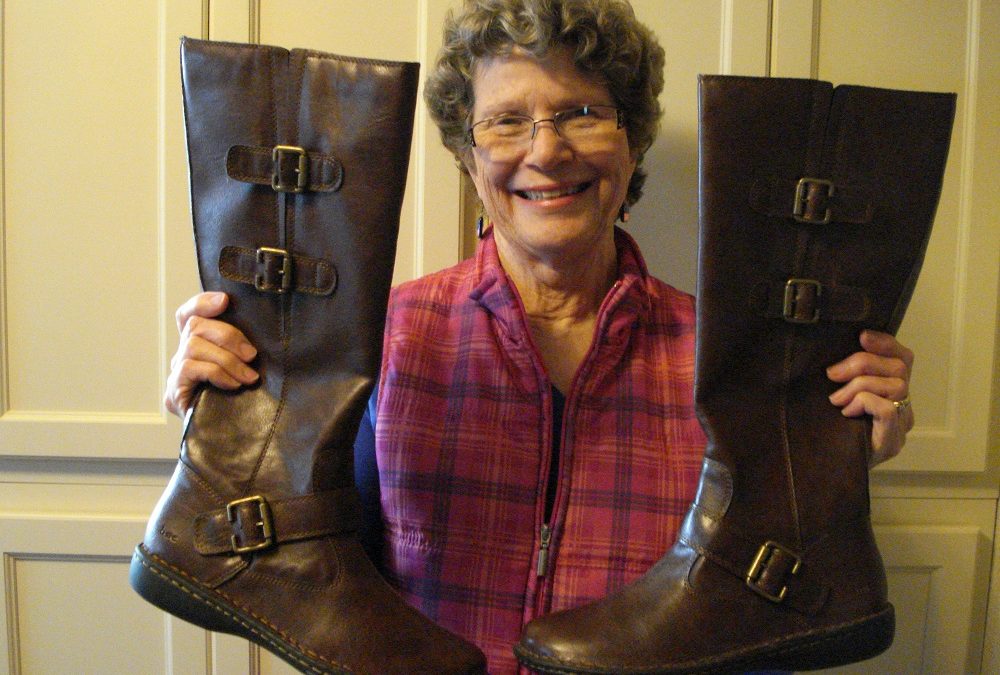
by wp-admin | Dec 9, 2021 | Exploring the Mental Fitness Formula
A penny saved is a penny earned.
Now that you can feel your Critical Parent (CP) at work, it’s more of a challenge to identify when your Indulgent Parent (IP) is stepping in. If your Adult fails to do this, you’ll certainly suffer the consequences. First it’s helpful to realize how often your Child takes control. Your Indulgent Parent facilitates your Child’s wired-in pleasure-seeking and pain-avoiding impulses. Marketing forces have focused billions of dollars and their shrewdest minds on how to target your Child without your Adult noticing. Sometimes you recognize their more blatant efforts to spin your Child into a strong and demanding force. The brain chemistry of this excitement can overwhelm your Adult, allowing you to buy the car you can’t afford or gamble away your savings. But with these big temptations, your Adult may be able to see the lies within the marketing and steer your Child into safer pleasures.
It’s when the ploy is more subtle that you can get taken in. When you see that something’s priced at $199.99, do you fully realize that it’s closer to $200 than $100? I get tricked by this even though I know the truth. My Child doesn’t want to face reality, so it overrides my Adult and gets the yummy new boots. My Indulgent Parent gives it permission to avoid facing this with Belief #9, that it’s more comfortable to avoid than to face responsibilities.. It also assures my Child that she’s special and deserves these great boots with Belief #11. Finally, my Indulgent Parent pushes Belief #10, that happiness depends on what life gives you. When my Child puts these boots on, it’s thrilled and feels just fine. When the credit card statement comes, my Critical Parent may berate it, calling it irresponsible and foolish. This would put a cloud over the pleasure of these tempting boots.
Your Indulgent Parent sets your child free to do whatever it wants right now. It overrides your Adult efforts to plan for a good future. It sabotages your budget, deludes you about how long things will take and lets you fail to keep your promises. Your Child is a force without its own judgment about the impact on your future or on others in your life. For you to have good relationships or develop what you plan, your Adult must have the support of your Wise Parent. Your Wise Parent can offer the revised beliefs that come from balancing your Critical and Indulgent Parent influences.
My Wise Parent, pulled in by my watchful Adult, could remind my Child that it also wants to get some plants for my garden, or take a trip to our favorite coastal town with the delightful basalt rocks along the ocean. It could note that $199.99 is just one cent away from $200.00 and the greedy advertising people are just trying to trick us. It could make clear that happiness comes from making wise choices about how to use your money, not really from the things money can buy. Your Wise Parent can remind your Child that it feels good to know you made a plan and followed it through to enjoy your life, and not feel foolish because you got distracted and cheated yourself out of guilt-free fun.
Your Child feels secure and has self-esteem when your Adult and Wise Parent take charge. It suffers when your Adult is careless and lets your Indulgent Parent seduce your Child with its permissive Toxic Beliefs.
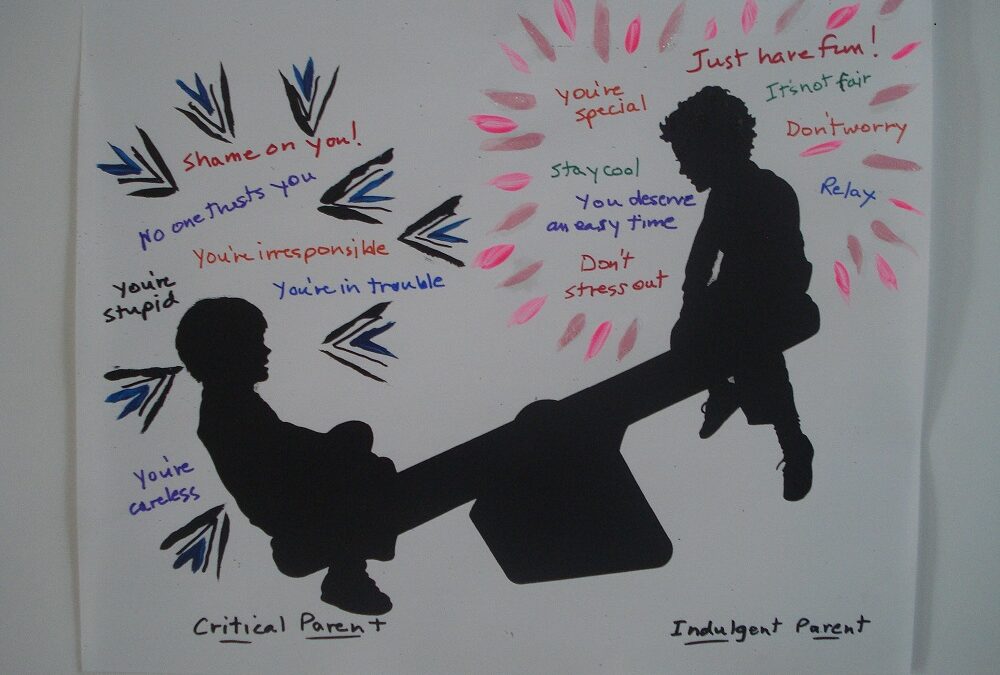
by wp-admin | Dec 9, 2021 | Exploring the Mental Fitness Formula
A see-saw of self-indulgence and self-punishment happens when you’re set up by your Indulgent Parent (IP). Your Critical Parent (CP) keeps you on a short leash so you can’t get into trouble, scolding your Child each time you fail to measure up to one of the six toxic beliefs your CP holds. Your Indulgent Parent soothes your child into a false sense of security as it supports the next six toxic beliefs.
Let’s take the example procrastination, Toxic Belief # 9, that it’s more comfortable to avoid than to face problems or responsibilities. This belief caters to your Child’s focus on present satisfaction rather than future security. Your Adult may caution, “Do I want the ice cream cone now, or the next-size-smaller pants in a month?” Then your Indulgent Parent whispers, “Oh, it won’t hurt to enjoy just this little treat. You deserve it. Why do today what you can put off until tomorrow?” Or you have a project for school or work that seems so difficult that you can feel your Child’s resistance in your gut. Your IP croons, “You don’t have to start that today; why not wait until you feel more up to it tomorrow?” It might add “It’s just not fair that they expect so much from you,” to encourage Belief # 11, that you’re special so you deserve an easier path.
A month later you’re still in the same size pants, your boss gives you a corrective action and your school project gets a failing grade. Your IP may still tell you it’s not fair or you don’t deserve such treatment, but your Critical Parent torments you for being lazy, irresponsible and lacking in character. Set up by your Indulgent Parent, you’ve traded future well-being for present comfort and your self-esteem has taken a hit. When this see-saw continues, it leads to decreased self-confidence, energy, hope and possible even to depression. Addiction is a frequent companion to this process, where your IP encourages using the drug-of-choice to gain temporary relief from the stress created by your failure to face problems or responsibilities. This process is described in detail in Part II, Chapter 2 of Claim Your Own Mental Fitness.
Your Adult must act with a firm hand to grab the see-saw and tell you to get off. It can identify Belief #9 along with any others involved. For example, your avoidance might have begun after you had a disappointing experience that prompted toxic belief #7, that it’s unbearable to work hard for something and not get it. Your IP may chime in to say, “you tried hard enough to (lose weight, get a promotion, get an A), so why keep trying?” Your Child’s Black and White thinking could prevent you from looking for new ways to cope: it’s fair or unfair, it’s easy or it’s too hard, you’re special or worthless.
Once you’re off the see-saw, and seated with a cool glass of water under a friendly tree, your Wise Parent (WP) could remind you that: 1. Black-and-white thinking traps you into quitting or avoiding, not creative problem solving. It’s better to consider how to cope in a different way. 2. When you put off doing something you have to do, you create low-level anxiety, not peace. You may also end up with additional problems that are even harder to manage. 3 It’s not unbearable if your aren’t rewarded each time you work hard for something; everyone has to learn how to deal with this sometime.
Your Adult can help you break up a task into bite-sized pieces Your Wise Parent can offer encouraging words like, “a journey of a thousand miles begins with a single step” or “remember when you did this well before and how you got there.”

by wp-admin | Dec 9, 2021 | Exploring the Mental Fitness Formula
When you see what’s wrong and you try to make it right, you will be a point of light. Randy Travis
This line from Randy Travis always brings me to tears. But wishing don’t make it so. First you must construct a lantern for your candle. This spark of inspiration and faith in yourself, like all fire, needs containment and guidance to become Travis’ point of light. Mrs. Fixit would say that the candle represents the unique set of skills and talents you have to fuel this light and your Adult must experiment with how to keep it burning. The glass in a lantern protects your inspiration from the wind and rain along your journey, and allows it to keep lighting your way. The metal housing gives your candle a firm base to keep it steady and an access point for recharging your fuel. The handle allows you to hold it up where you need its luminance. You’ll construct your own unique lanterns as you go.
To claim your own mental fitness, you must have a grasp of just what you need to navigate in your life. The system I’ve been describing in this blog and in Claim Your Own Mental Fitness offers the means to construct this for yourself. Here’s a review of the key elements:
- Child: the energy, talents and interests that constitute the raw material for your candle
- Indulgent Parent: the unfettered permission to explore and express Child impulses in potentially scented and malleable wax-like form
- Critical Parent: the limiting and shaping instrument that forms your candle
- Wise Parent: balances these two, allowing a well-shaped and sturdy candle that’s not too brittle or too soft
- Adult: monitors these as you go through your days, adjusting each and creating your Wise Parent as it revises the Toxic Beliefs of your Indulgent and Critical Parents. It trims your wick just right and makes sure your candle is ready for your journey into relationships and managing your daily life.
The skills your Adult needs to provide this guiding influence are contained in the FORMULA. Remember, it must Focus inward upon your Child and Parent parts, Observe what Toxic Beliefs might be triggering fight-or-flight and Revise these to calm your system and make the new versions available in your Wise Parent. Then your Adult must Monitor for any needed adjustments, continually Using your Child’s body-linked feedback that fight-or-flight has begun. Next your Adult must support your Child’s feelings of hope, confidence and strength by Lightening its day with fun, inspiring, healing and energizing experiences. This keeps your light shining brightly. Finally Your Adult must learn how to Apply this system when you interact with other people and when life stresses you in new ways that threaten to take you into overwhelming emotional darkness.
Three-year-olds don’t design lanterns. With their immature pre-frontal cortexes, they can’t monitor well or study how other people have found ways to become steady points of light. Gradually we develop the mental ability to do this, but we often get very poor guidance for how to build effective lanterns as we go through life. Expect to work hard for mental fitness. Even when you know how to work with your different mind aspects and practice the FORMULA, it’s still very hard to keep a steady march with your point of light through all the stressors you encounter.
Once you have your lantern, how can you “see what’s wrong and try to make it right?” Your Adult must be like Syd Mead’s robot “Number Five” in the 1986 film Short Circuit, open to and hungry for INPUT. Humans through all our history have struggled with the same issues facing you. They’ve written about what’s helped them, often brilliantly. Nowadays movies and other videos offer new avenues for study. To keep your Adult functioning well you must keep practicing the FORMULA and also become a life-long learner about mental fitness.
Study the Wise Parent guidance of others you respect to decide what you believe is right or wrong. Don’t be too proud or too lazy to explore what they have to offer if you want mental fitness. Your steady light can lead others to light their own candles and see what’s wrong, then try to make it right.

by wp-admin | Dec 9, 2021 | Exploring the Mental Fitness Formula
The graph above describes an intuitive view of the grief process, based on how much energy grief seems to require at each stage. The way energy flows in your process may be different, but what’s important is for your Adult to learn how to recognize the five stages as they happen. Grief can prevent mental fitness and the kind of joy that makes life a rich adventure. It sucks out the hope human beings need to keep engaging in life. Seeing grief in five stages allows your Adult to track your progress and observe when you’re moving forward, sliding back or getting stuck. Humans do seem to share this five-stage process while they grieve in their own way.
In this post we’ll look at the first two stages of this process and the next three in the following post. Toxic Beliefs create unrealistic expectations for what life brings you. You have a loss to grieve each time these aren’t met. The beliefs of your Critical Parent may cause you to lose confidence in yourself as well as others. For example, Belief #3 encourages you to set standards for yourself and others that may be unrealistic. Your Indulgent Parent embraces Belief #8, that happiness depends on what happens to you and other beliefs that make you expect more from other people than you’ll receive and less from yourself. Each of these Parents sets you up to expect things that your Adult could recognize are unrealistic.
Denial and bargaining are the first stages of the grief process. They can happen outside of your awareness for just awhile or for years. In many cases Toxic Beliefs that interfere with your Adult functioning were somewhat valid when you were a child. If your parents had outgrown these, they might have offered role models for how to revise them as you grew up. If not, you’ll need to do this on your own, possibly with the support of wise, mature friends or a counselor. Your watchful Adult can learn to recognize their influence and help you face and heal your losses. Your Wise Parent can become your Child’s reliable internal support, replacing your Critical and Indulgent Parents as it comforts you with revised beliefs. This support will allow your Child to tolerate the next stages of your grief process and reduce tendencies to revert back into previously visited stages.
Denial begins when your Child can’t believe or accept that what she counted on doesn’t happen. Perhaps your mother didn’t make you feel loved and Belief #1 that you must have the love of a significant person, haunts you years later with fight-or-flight reactions in close relationships. You need a way to grieve and heal this wound, but your Adult can’t tackle this problem as long as you deny its impact. Perhaps your father’s job helped reinforce his father’s embrace of Belief #3, that his standards must always be met, and he was unfairly critical of you and others. Maybe your grandmother’s Indulgent Parent encouraged you to feel like you deserve to feel sorry for yourself when things don’t go easily for you and you’re upset to be disappointed over and over again (Belief # 11 or # 12). As long as you deny or minimize these very painful facts (with or without awareness), your Adult can’t revise your beliefs, and you don’t build a Wise Parent to comfort you.
Bargaining happens when you use irrational strategies to maintain your denial. Belief # 1 could lead you to minimize what one parent did to hurt you, because you feel like you must have at least one parent who loved you when you were a child. As an adult, this belief might keep you from being assertive with a friend or partner as your Child trembles with the fear of losing him. Belief #3 could make you try to pressure others to behave according to the standards you’ve learned and get very disappointed when they don’t. You might block out or lie about memories from the past if Belief # 5 leads you to fear that your past determines what your present life can be. This internal bargaining might delay loss of a friend or a job, but it may also set you up for more loss when you friend or associate loses respect for you and doesn’t want you around any longer.
You’ll note on the graph that these denial efforts do cost more energy than when you’ve resolved the grief process. If you remain in denial and bargaining, your Child’s sense of security remains lower and your Indulgent and Critical Parents respond with heightened signals for fight-or-flight. When a new loss occurs, your Adult will have less ability to sort out what’s going on as your feelings of fight-or-flight escalate. If your Adult can keep resolving your grief as events happen, you’ll be resilient for future disappointments, frustrations and trauma. This requires you to move out of denial and on to the next stages of grief, anger, sadness and acceptance.
Social anxiety is another common issue for HSPs. It is a chronic form of Personalization that can be isolating and very harmful. It’s the feeling that the people around you are always looking for ways to find fault with you. I remember feeling sick to my stomach as I sat among the 20 kids in my kindergarten class for most of the year. As a young teenager I’d easily be triggered into the same feeling when I had to cope with several kids. This problem was worsened because my family often enjoyed teasing me until I cried and ran away when we sat at the dinner table. They justified this by telling me, “The world’s a harsh place and we’re trying to help you stop being so sensitive.”*
Although most of my HSP clients weren’t tormented, social anxiety was prevalent for them. I was so miserable by age twelve that I began reading to find some answers. I received my first Bible and loved to read about the kindness that Jesus taught people to offer everyone. I read my dad’s copy of How to Win Friends and Influence People and discovered that people need you to focus on them and listen well. I journaled every night, noting whether I had done that. I was a lonely, intense and talkative kid, so this was difficult, but I learned to stop sharing much about myself with anyone but a couple friends and to listen well.
One fascinating thing I discovered during this self-improvement effort was how really focused on themselves most people (including me) are. It was such a relief to realize that I could be invisible to most people simply by not talking. As I shared these strategies with my HSP clients, I received the most surprised reactions when they tried this experiment: When you’re in a group of people you don’t know well, engage another person in light conversation (“small talk”) by asking about them, their family, their hobbies, their job, what they’ve done for fun lately. Encourage them to talk for a while and then add a very brief comment about yourself related to what they’ve been sharing. See how long it is before they look at their watch. My clients usually were skeptical, but would return and exclaim that they couldn’t believe how quickly others actually did that, and then moved on to talk with someone else. We agreed that those who actually kept interacting might be friend material, unless they were leading up to a marketing proposal.
When I worked for the Dale Carnegie classes in Chicago I was taught how to engage a boss to listen and sometimes make the choice to pay for an employee to take the classes that embodied what I’d read in his book when I was twelve. It brought me to tears to see how others were transformed in the fourteen-week, four-hours-a-night class. Gradually, I overcame most of my remaining social anxiety as I grew in my interpersonal skills and discovered that others’ responses really had almost nothing to do with me. I never became a great salesperson, but what I learned has meant so much more than money for the rest of my life.
Another problem HSPs have is that too often when they tell their doctors about their anxiety and how it cripples them, they’re offered addictive medication (like the valium I was prescribed and didn’t take). Usually they aren’t clearly referred for counseling, where they could learn how to cope without this, even when the meds begin to cause serious problems. I’ve worked with HSPs addicted to these medications who went thru hell to get off of them because of their HSP sensitivity to these drugs.
*In Elaine Aron’s video, Sensitive, she describes how often family and friends may try this damaging approach with HSPs and provides a thorough description of what a “Highly Sensitive Person” is. It’s available for about $10.00 at her website, www.hsp.com .
principle of human nature is the craving to be appreciated. (From the Dale Carnegie Course, 1976)
Here’s a new take on compassion and assertiveness! For a stronger Adult, a wiser Wise Parent and a more secure Child, consider the story of “Compassion, Assertiveness and the Pop-Bead Puppy.”
As I sat feeling exhausted in my doctor’s sunny waiting room, an older man holding a string of gold-colored pop-beads came over to me. He said “I want to give you something.” I was touched by his kind, gentle manner and invited him to sit next to me. Before retiring he’d traveled all around Louisiana working for Carpenter Tractors. Gradually he’d discovered that what he loved best to do was “put a smile on a someone’s face.” He said giving tiny pop-bead animals to people was his way to do that and he twisted the golden beads into a puppy for me.
I asked the Bead Man what he did when people got annoyed and treated him like he was trying to do something harmful to them. His face darkened and he said, “That’s bad.” After a moment he added, “but I know He (pointing upward as his face brightened) knows what I’m doing. I shared with him how I’d spent my life trying to find ways to do the same thing. I thanked him and as he left we laughed about how we both “just couldn’t get enough of those wonderful smiles.” This left me to ponder the issue of how humans react to what others offer them.
This gentle man felt really bad when people turned their eyes and hearts away from him as though he were panhandling for loose change. He wanted so much for people to give his gift a chance and could only keep going because he believed that a Higher Power recognized and appreciated him every time. Let’s consider what his motives might have been to perform this unusual behavior. Was he really panhandling for something else that would take from others much more than it gave? We’d call that self-serving and turn away. We could stay open to a friend who did that for a while, but not a stranger. Perhaps we’d fear that if we “gave him an inch, he’d take a mile,” and try to expand the contact into asking, say for a meal or a donation or more listening than we wanted to offer.
The Bead Man told me he just did this to see me smile. Why would he want to do that? He could be one of Elaine Aron’s HSP’s with “sensory processing sensitivity,” whose mirror neurons in their brain get more excited by smiles than the other 80% of the population, so he’d just be sharing what he loves. Chefs, artists, car dealers and most of the rest of us like to do that with others who enjoy the same things. They learn not to take rejection of their gifts as a rejection of themselves and to accept that what they offer may have limited appeal. Finally, he may have found this as a way to somehow transform grief from his life, like the mothers whose children were killed by drunk drivers joined to form MADD, with profoundly rooted zeal and determination to keep fewer children from dying this way.
When someone offers you a gift with an extra urgency that could make you suspicious and turn away, try staying open and allow your Adult to consider thoughtfully where this earnest person is really coming from. Unless there could actually be life-or-death consequences, let your Wise Parent assure your Child that your assertive Adult can set effective limits as needed. Remember that all of us want recognition and appreciation from each other, whatever our styles and the gifts we offer. You may find a kindred spirit along the way to brighten the path of your journey and soothe the pain we all find as we travel.

by wp-admin | Dec 9, 2021 | Exploring the Mental Fitness Formula
Why do today what you can put off till tomorrow? A clear desk is the sign of a sick mind. A stitch in time saves nine. Research has shown that order in our surroundings reduces anxiety. You should be more responsible!
Full disclosure, this is a picture of my craft room/office today! The balance between my Critical and Indulgent Parents and my Wise Parent teeters on the edge when I get too involved in a project like completely revising my website. The stack of unfiled papers seems innocent until I can’t find a document I must have. The flurry of sticky notes, small tablets of ideas to consider and unfinished posts requires me to shuffle through them as I work. My hard copy files are mostly in chaos and I have pieces of craft projects stuck all around the room. But I keep focusing on getting this done and then I’ll take some time to put it in order again. Fortunately I can escape to more orderly rooms as needed.
Procrastination offers lots of opportunity for humor and it’s good to laugh at yourself when you notice that you’ve yet again sabotaged the quality of your efforts and your peace of mind. Belief # 9 states that it’s more comfortable to avoid than to face problems or responsibilities. When you realize how Belief #9 ignites fight-or-flight, you won’t be so amused. You’ll notice that the other Indulgent Parent beliefs depend on Belief # 9, and its power to encourage flight from problems you face. Your Adult should look for these other beliefs when your body signals that your Child’s anxiety has increased.
When you think of procrastination, you probably consider a project you resist doing or the time-crunch created because you put something off too long. But this toxic avoidance occurs far more widely than that. It happens whenever your Adult fails to manage your Child’s impulses to seek comfort right now. Without your Adult’s attention you may replace problem-solving behavior with activities that please your Child so much that you actually forget the reality you’re avoiding. These activities can become addictions which disable your Adult and allow neglect of your problems and responsibilities, sometimes for years. Claim Your Own Mental Fitness, Part II, Chapter 2 in my book offers insights about several addictions.
Because your fight-or-flight tendencies never disappear, your Adult must not take a vacation from managing them. The first step to prevent damaging avoidance is to recognize the influence of your Indulgent Parent quickly. Your Adult can observe that flight dominates when you first choose to avoid things; but then fight can take over if anyone tries to push your Child into facing your issues. Your Adult can’t take much time off, just like the baby-sitter for a three-year-old. People vary in how quickly their Child will get hooked on avoidant or just fun activities. But no one can trust a Child to cope with life on its own.
You can’t allow too much humor about this; keeping your Adult in charge is the key to mental fitness and the self-respect, self-confidence and relationship-satisfaction that it brings. In fact, your Wise Parent must reinforce Adult efforts to prevent your Child from luring you into too much indulgent behavior. Look up “procrastination” online to discover many wise people’s statements to build up your Wise Parent.
Gradually, your Wise Parent’s self-talk will overcome your Indulgent Parent’s influence and support your Adult as it reminds you that almost no problems are unbearable or life-threatening. They’re just boring, frustrating, annoying, embarrassing, unfair, inconvenient or temporarily overwhelming. No need for fight-or-flight, we’ve got this. It’s not more comfortable in the long run to avoid unpleasant realities. We’ve noted how Belief # 9 impedes the grief process when denial and anger prevent you from facing your sadness. It’s only a temporary solution promoted by your Indulgent Parent. Using the FORMULA, your Adult and Wise Parent together can gradually reassure your Child to the point that your Adult won’t have to work so hard to stay on task.

by wp-admin | Jan 3, 2016 | Exploring the Mental Fitness Formula


In post 16, “Brain Differences and Fight-or-Flight,” I discussed how some people, whose wiring is significantly different from average, struggle harder to keep their Adult in charge. Now I’d like to describe how we, who are troubled by our differences, must resolve our grief over them to stabilize our Adult long-term. We must fortify our Wise Parent to be even stronger than average to avoid damaging shame, anger, anxiety and depression. We need to find within and outside ourselves sheltering branches, like those in the rock family picture, to comfort us as we try to cope. I’ll use my journey with this as a Highly Sensitive Person (HSP) to illustrate.
I knew I had to work harder by age ten because of my social anxiety and awkwardness. I also disliked how I could get easily annoyed by small things and very upset over any teasing. By age twelve I was studying Benjamin Franklin’s diary, where he tracked about a dozen behaviors for self-improvement. He noted that, as his score improved in the other areas, his humility score decreased. After reading Dale Carnegie’s How to win Friends and Influence People, I kept notes daily on how well I listened to others and refrained from sharing much about myself. I remained very closed off, except with one or two friends, until I went to college. I’ve seen many HSP clients who never tried again to engage with groups socially after junior high. (See hsperson.com with Elaine Aron.)
Until my first marriage failed at age 27, I didn’t have much non-work social contact due to my need to study hard in college and work many hours a day after that. At that point I received an assistantship for my Ph.D. program in Counseling Psychology. Over-reacting to my divorce, I was wracked with relentless insomnia and panic attacks. I grabbed every idea from my course work that I could about how to heal myself, for my own survival and so I could be a good mother to my two-year-old son. I didn’t accept the valium I was offered. The horrible panic attacks proved a gift for my healing and my ability to help others. I practiced the cognitive therapy and intense self-observation I learned in my classes day and night. I discovered exactly what self-talk and circumstances would set off or shut down a panic attack, and got over them in five years. The insomnia persists whenever I take on too much in my life or let even a minor social interaction disturb me. I still resent that.
I discovered that saying punishing things to myself out of frustration with my HSP wiring (now identified as sensory processing sensitivity) only provoked more anger, anxiety and panic. I learned to be gentle with my Child just to stay out of fight-or-flight. I realized this positive approach, and not the negative confrontations popular then, would also be most helpful to clients. I had to revise especially my Critical Parent’s toxic beliefs to sustain this approach and build a strong Wise Parent. To do this on a stable basis, I had to complete my grief process over the HSP brain I was dealt, long before the HSP trait was identified. I knew I wasn’t just suffering from the divorce trauma; I’d always been too anxious and hyper-sensitive. Denial, anger, and sadness over how I was different all had to be fully processed for me to reach self-acceptance.
Of course, many others have brain differences which cause them much more pain and limit them worse than being an HSP. But somehow they must also find a way to accept themselves in order to enjoy the gifts they do have, especially when others judge and blame them. Temple Grandin has done a heroic job of this with autism, but we can’t all manage that. If we just grow our Wise Parent’s sheltering branch inside and find the environment that supports us, we can each thrive in our own way. Compared to those with schizophrenia, severe bipolar disorder or other major impairments to their Adult functioning, my struggles are nothing.
It’s crucial that individuals and society stop indulging their biases against people who are mentally different in crippling ways. Worldwide mental health services are poorly funded and inadequate. It’s not true that everyone is born and raised to be equally capable of managing life. It’s the worst expression of our primitive human nature to shun them and leave them to suffer. We don’t have to do that to survive like our distant ancestors may have. These people deserve the deepest compassion and steadiest, wisest support from us fellow humans to help them be kind to themselves while they search for ways to join in.

 When I was fourteen I decided to make a mosaic out of the stones I’d collected from the Lake Michigan beach near us. My dad took me to the lumber yard to get Elmer’s Glue and a handy-panel and I began sorting them on the back patio. I drew a rough design and spent hours for several days creating this rambling picture that may somehow capture who I was then.
When I was fourteen I decided to make a mosaic out of the stones I’d collected from the Lake Michigan beach near us. My dad took me to the lumber yard to get Elmer’s Glue and a handy-panel and I began sorting them on the back patio. I drew a rough design and spent hours for several days creating this rambling picture that may somehow capture who I was then.











